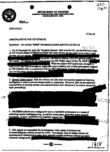Reporters Without Borders
Reporters Without Borders, also known as Reporters sans frontières (RSF), is a leading international non-profit and non-governmental organization that safeguards the right to freedom of information. Its mandate is to promote free, independent and pluralistic journalism and to defend media workers. Its advocacy is founded on the belief that everyone requires access to the news and information, inspired by Article 19 of the UN Declaration of Human Rightsthat recognises the right to receive and share information regardless of frontiers, along with other international rights charters.[1] RSF has consultative status at the United Nations, UNESCO, the Council of Europe, and the International Organisation of the Francophonie.[2]
Reporters Sans Frontières | |
 | |
| Formation | 1985 |
|---|---|
| Founder | Robert Ménard, Rémy Loury, Jacques Molénat and Émilien Jubineau |
| Type | Nonprofit organization, non-governmental organization with consultant status at the United Nations |
| Headquarters | Paris, France |
Director General | Christophe Deloire (since July 2012) |
Key people | Christophe Deloire, Secretary General Pierre Haski, President RSF France Mickael Rediske, President RSF Germany Christian Mihr, CEO RSF Germany Rubina Möhring, President RSF Austria Alfonso Armada, President RSF Spain Gérard Tschopp, President RSF Switzerland Erik Halkjær, President, RSF Sweden Jarmo Mäkelä, President, RSF Finland |
Budget | €6 million (RSF France) |
Staff | Approximately 100 |
| Website | RSF.org |
Activities
RSF works on the ground in defence of individual journalists at risk and also at the highest levels of government and international forums to defend the right to freedom of expression and information. It provides daily briefings and press releases on threats to media freedom in French, English, Spanish, Portuguese, Arabic, Farsi and Chinese and publishes an annual press freedom round up, the World Press Freedom Index, that measures the state of media freedom in 180 countries. The organisation provides assistance to journalists at risk and training in digital and physical security, as well as campaigning to raise public awareness of abuse against journalists and to secure their safety and liberty. RSF lobbies governments and international bodies to adopt standards and legislation in support of media freedom and takes legal action in defence of journalists under threat.[3]
To mark World Day Against Cyber-Censorship on 12 March, Reporters Without Borders (RSF) has unveiled a list of 20 Digital Predators of Press Freedom and announces that it is now unblocking access to a total 21 websites in the sixth year of its Operation Collateral Freedom.[4]
History
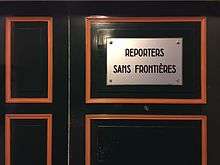
RSF was founded in Montpellier, France in 1985 by Robert Ménard, Rémy Loury, Jacques Molénat and Émilien Jubineau. It was registered as a non-profit organization in 1995.[5] Ménard was RSF's first secretary general, succeeded by Jean-Francois Juillard. Christophe Deloire was appointed secretary-general in 2012.[6]
Structure
RSF's head office is based in Paris. It has 13 regional and national offices, including Brussels, London, Washington, Berlin, Rio de Janeiro and Dakar, and a network of 146 correspondents.[7] It employs 57 salaried staff in Paris and internationally.[8] A board of governors, elected from RSF's members, approves the organisation's policies.[9] An International Council has oversight of the organisation's activities and approves the accounts and budget.[10]
Advocacy
World Press Freedom Index
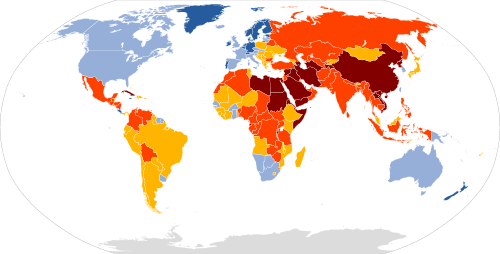
|
Very serious situation
Difficult situation
|
Noticeable problems
Satisfactory situation
|
Good situation
Not classified / No data
|
Information and Democracy Initiative
In 2018, RSF launched the Information and Democracy Commission to introduce new guarantees for freedom of opinion and expression in the global space of information and communication. In a joint mission statement, the Commission's presidents, RSF secretary-general Christophe Deloire and Nobel laureate Shirin Ebadi identified a range of factors currently threatening that freedom. This includes: political control of the media, subjugation of news and information to private interests, the growing influence of corporate actors, online mass disinformation and the erosion of quality journalism.[12]
This Commission published the International Declaration on Information and Democracy to state principles, define objectives and propose forms of governance for the global online space for information and communication.[13] The Declaration emphasised that corporate entities with a structural function in the global space have duties, especially as regards political and ideological neutrality, pluralism and accountability. It called for recognition of the right to information that is diverse, independent and reliable in order to form opinions freely and participate fully in the democratic debate.[13]
At the Paris Peace Forum in 2018, 12 countries launched a political process aimed at providing democratic guarantees for news and information and freedom of opinion, based on the principles set out in the Declaration.[13]
Journalism Trust Initiative
RSF launched the Journalism Trust Initiative (JTI) in 2018 with its partners the European Broadcasting Union (EBU), Agence France Presse (AFP) and the Global Editors Network (GEN). JTI defines indicators for trustworthy journalism and rewards compliance, bringing tangible benefits for all media outlets and supporting them in creating a healthy space for information. JTI distinguishes itself from similar initiatives by focusing on the process of journalism rather than content alone. Media outlets will be expected to comply with standards that include transparency of ownership, sources of revenue and proof of a range of professional safeguards.[14]
Actions
RSF's defence of journalistic freedom includes international missions, the publication of country reports, training of journalists and public protests. Recent global advocacy and practical interventions have included: opening a centre for women journalists in Afghanistan in 2017, a creative protest with street-artist C215 in Strasbourg for Turkish journalists in detention, turning off the Eiffel Tower lights in tribute to murdered Saudi journalist Jamal Kashoggi and providing training to journalists and bloggers in Syria.[15][16][17] In July 2018, RSF made an unprecedented mission to Saudi Arabia calling for the release of 30 journalists.[18] The organisation publishes a gallery of Predators of Press Freedom, highlighting the most egregious international violators of press freedom.[19] It also maintains an online Press Freedom Barometer, monitoring the number of journalists, media workers and citizen journalists killed or imprisoned.[20] Its programme Operation Collateral Freedom, launched in 2014, provides alternative access to censored websites by creating mirror sites: 22 sites have been unblocked in 12 countries, including Iran, China, Saudi Arabia and Vietnam.[21] RSF offers grants to journalists at risk and supports media workers in need of refuge and protection.
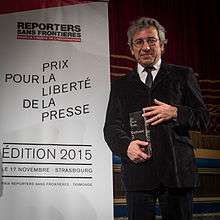
Prizes
RSF's annual Press Freedom Prize, created in 1992, honours courageous and independent journalists who have faced threats or imprisonment for their work and who have challenged the abuse of power. TV5-Monde is a partner in the prize.
A Netizen Prize was introduced in 2010, in partnership with Google, recognising individuals, including bloggers and cyber-dissidents, who have advanced freedom of information online through investigative reporting or other initiatives.
In 2018, RSF launched new categories for the Press Freedom Prize: courage, independence and impact.
Press Freedom Prizewinners 1992-2019:
- 1992 Zlatko Dizdarevic, Bosnia-Herzegovina
- 1993 Wang Juntao, China
- 1994 André Sibomana, Rwanda
- 1995 Christina Anyanwu, Nigeria
- 1996 Isik Yurtçu, Turkey
- 1997 Raúl Rivero, Cuba
- 1998 Nizar Nayyouf, Syria
- 1999 San San Nweh, Burma
- 2000 Carmen Gurruchaga, Spain
- 2001 Reza Alijani, Iran
- 2002 Grigory Pasko, Russia
- 2003 Ali Lmrabet, Morocco; The Daily News, Zimbabwe; Michèle Montas, Haiti
- 2004 Hafnaoui Ghoul, Algeria;[22] Zeta, Mexico; Liu Xiaobo, China
- 2005 Zhao Yan, China; Tolo TV, Afghanistan; National Union of Somalian Journalists, Somalia; Massoud Hamid, Syria
- 2006 Win Tin, Burma; Novaya Gazeta, Russia; Guillermo Fariñas Hernández, Cuba
- 2007 Seyoum Tsehaye, Eritrea; Democratic Voice of Burma, Burma; Kareem Amer, Egypt; Hu Jia, Zeng Jinyan, China
- 2008 Ricardo Gonzales Alfonso, Cuba; Radio Free NK, North Korea;[23] Zarganar and Nay Phone Latt, Burma
- 2009 Amira Hass, Israel; Dosh, Chechnya[24]
- 2010 Abdolreza Tajik, Iran;[25] Radio Shabelle, Somalia
- 2011 Ali Ferzat, Syria; Weekly Eleven News, Burma
- 2012 Mazen Darwish, Syria; 8Sobh, Afghanistan
- 2013 Muhammad Bekjanov, Uzbekistan;[26] Uthayan, Sri Lanka
- 2014 Sanjuana Martínez, Mexico; FrontPage Africa, Liberia; Raif Badawi, Saudi Arabia
- 2015 Zeina Erhaim, Syria; Zone9, Ethiopia; Cumhuriyet, Turkey
- 2016 Hadi Abdullah, Syria; 64 Tianwang, China; Lu Yuyu and Li Tingyu, China
- 2017 Tomasz Piatek, Poland; Medyascope, Turkey; Soheil Arabi, Iran
- 2018 Swati Chaturvedi, India; Matthew Caruana Galizia, Malta; Inday Espina-Varona; Philippines; Carole Cadwalladr, United Kingdom
- 2019 Eman al Nafjan, Saudi Arabia; Pham Doan Trang, Vietnam; Caroline Muscat, Malta
Netizen Prize
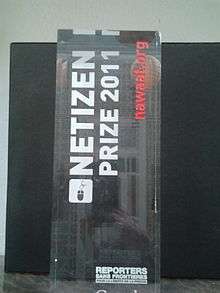
- 2010 Change for Equality website, www.we-change.org, women’s rights activists, Iran
- 2011: Nawaat.org, bloggers, Tunisia
- 2012: Local Coordination Committees of Syria, media centre, citizen journalists and activists, Syria
- 2013: Huynh Ngoc Chenh, blogger, Vietnam
- 2014: Raif Badawi, blogger, Saudi Arabiar
- 2015: Zone9, blogger collective, Ethiopia
- 2016: Lu Yuyu and Li Tingyu, citizen journalists, China[27]
Publications
In addition to its country, regional and thematic reports, RSF publishes a photography book 100 Photos for Press Freedom three times a year as a tool for advocacy and a fundraiser. It is a significant source of income for the organisation, raising nearly a quarter of its funds in 2018:[28]
Selected reports
- 2016 Freedom of expression under state of emergency, Turkey (with ARTICLE 19 and others)[29]
- 2016 When oligarchs go shopping[30]
- 2017 Who owns the media?[31]
- 2017 Media Ownership Monitor, Ukraine (with Ukrainian Institute of Mass Information)[32]
- 2018 Women’s Rights: forbidden subject[33]
- 2018 Journalists: the bête noire of organised crime[34]
- 2018 Cambodia: independent press in ruins[35]
- 2018 Women’s rights: forbidden subject[33]
- 2019 China’s Pursuit of a New World Order Media[36]
- 2019 Media Ownership Monitor, Pakistan (with Freedom Network)[37]
Funding
RSF’s budget for 2018 totalled €6.1m. Fifty per cent of the organisation’s income comes from public subsidy; 12 per cent from foundations; 24 per cent from the publication of photography books and 9 per cent from public donations. Foundations supporting RSF’s work include Adessium, IEDDH (International Cooperation and Development, European Commission), SIDA (Swedish International Development Cooperation Agency), and Omidyar.
RSF has attracted criticism in previous years for accepting funding from the National Endowment for Democracy in the US and the Center for a Free Cuba. At the time, secretary-general Robert Ménard pointed out that funding from NED totalled 0.92 per cent of RSF’s budget and supported African journalists and their families.[38] RSF ceased its relationship with the Center for a Free Cuba in 2008.[39]
Public Profile
Recognition
RSF has received multiple international awards honouring its achievements:
- 1992: received the "Lorenzo Natali Prize" from the European Commission for defending human rights and democracy.
- 1997: received the "Journalism and Democracy Prize" from the Parliament Assembly of the Organization for Security and Co-operation in Europe (OSCE).
- 2005: shared the European Parliament's Sakharov Prize for "Freedom of Thought" with Nigerian human rights lawyer Hauwa Ibrahim and Cuba's Ladies in White movement.[40]
- 2006: received an International Emmy Award from the International Academy of Television Arts and Sciences.
- 2007: received the "Asia Democracy and Human Rights Award" from Taiwan Foundation for Democracy and the "Dawit Isaak Prize" from Swedish Publicists' Association.
- 2008: received the "Kahlil Gibran Award for Institutional Excellence" from the Arab American Institute Foundation.
- 2009: shared the "Roland Berger Human Dignity Award" with Iranian human rights lawyer and Nobel peace laureate Shirin Ebadi.[41]
- 2009: received the "Médaille Charlemagne" for European Media.
- 2012: received the "Club Internacional de Prensa" Award, in Madrid.
- 2013: received the "Freedom of Speech Award" from the International Association of Press Clubs, in Warsaw.[42]
- 2014: City of Bonn's 2014 DemokratiePreis.[43]
- 2019: Dan David Prize, Defending Democracy, jointly with Michael Ignatieff[44]
RSF was criticised for accepting the Dan David Prize, awarded by the Dan David Foundation in Israel.[45]
Criticism
Reports published in the Council on Hemispheric Affairs and the US Newspaper Guild journal in 2005 criticized RSF for receiving funding from the US government and Cuba opposition groups, and for being part of a ‘neocons crusade’ against the Castro regime. RSF denied the allegations of a political agenda, but confirmed that it had received a grant from the National Endowment for Democracy which is funded through the State Department and from the Centre for a Free Cuba.[46] In 2006, online magazine Counterpunch claimed that RSF had falsely linked former President Jean-Bertrand Aristide to the murder of journalists and had failed to criticise his successor’s crackdown on press freedom.[47] RSF was criticised for supporting media outlets that were in favour of the coup attempt in Venezuela in 2002.[48] In response, RSF pointed out that it had in fact condemned media support of the coup.[49]
See also
- The Uncensored Library
- Avocats Sans Frontières
- Chilling effect
- Committee to Protect Journalists
- Electronic Frontier Foundation
- Freedom of speech
- Freedom of the Press Foundation
- Freedom of the Press report
- Internet censorship by country
- List of sovereign states in Europe by Press Freedom Index
- List of indices of freedom
- Media transparency
- Organization for Security and Co-operation in Europe statistics
- Political repression of cyber-dissidents
- Technology diffusion
- The Coalition For Women In Journalism
References
- RSF Annual Report 2018, p5
- "Presentation, Reporters Without Borders (RSF), for freedom of information". RSF. 2016-01-22. Retrieved 20 February 2020.
- RSF Annual Report 2018, pp14-16
- "2020 World Day Against Cyber-Censorship : RSF compiles Digital Predator list, unblocks more censored websites". RSF. Retrieved 31 March 2020.
- "RSF Presentation". RSF. 2016-01-22. Retrieved 24 February 2020.
- "Christophe Deloire appointed Reporters Without Borders director-general". RSF. 2012-05-21. Retrieved 24 February 2020.
- RSF Annual Report 2018, pp51-52
- RSF Annual Report 2018, p10
- "Administration Board". RSF. 2016-07-26. Retrieved 24 February 2020.
- "International Council". RSF. 2016-07-26. Retrieved 24 February 2020.
- "2020 World Press Freedom Index". Reporters Without Borders. 2020.
- Ebadi, Shirin, et Christophe Deloire (20 July 2018). "Information and Democracy Commission LETTRE DE MISSION" (PDF). Reporters Without Borders. Retrieved 18 February 2020.
- "RSF Declaration". RSF. Retrieved 2 March 2020.
- "RSF and partners launch a public consultation on the Journalism Trust Initiative". RSF. 2 March 2020. Retrieved 2 March 2020.
- "RSF opens first center for the protection of Afghan women journalists". RSF. Retrieved 2 March 2020.
- "Turkey's imprisoned journalists pin hopes on European Court". RSF. Retrieved 2 March 2020.
- "RSF blacks out Eiffel Tower for slain journalists, a month after Khashoggi death". RSF. Retrieved 2 March 2020.
- "Media watchdog visits Saudi Arabia to free journalists". Al Jazeera. 10 July 2019. Retrieved 2 March 2020.
- "Predators gallery". RSF. Retrieved 2 March 2020.
- "Barometer". RSF. Retrieved 2 March 2020.
- "#CollateralFreedom: RSF unblocks 22 sites censored in their own country". RSF. Retrieved 2 March 2020.
- "Hafnaoui Ghoul freed provisionally after being held for six months for libel". RSF. 26 November 2004. Retrieved 5 March 2020.
- "N. Korean Defectors Fight Regime with the Radio". NPR. 24 October 2006. Retrieved 5 March 2020.
- 4 December 2009. ""Reporters Without Borders" award "Dosh" magazine from Chechnya". Caucasian Knot. Retrieved 5 March 2020.
- "Journalist Abdolreza Tajik, 2010 press freedom prize winner, is freed from prison". RSF. 23 December 2010. Retrieved 5 March 2020.
- "US, Uzbekistan - RSF welcomes Muhammad Bekjanov, once the world's longest-detained journalist, to Washington". RSF. 21 September 2018. Retrieved 5 March 2020.
- "Lu Yuyu and Li Tingyu, the activists who put non news in the news". CLB. 18 August 2017. Retrieved 5 March 2020.
- "Albums Photo". RSF. Retrieved 5 March 2020.
- "Turkey: "You cannot report the news under the state of emergency". RSF. 5 October 2016. Retrieved 5 March 2020.
- ""Media: when oligarchs go shopping" – RSF's latest report". RSF. 20 July 2016. Retrieved 5 March 2020.
- "Who owns the media in France?". RSF. 8 December 2017. Retrieved 5 March 2020.
- "Media Ownership in Ukraine: informal influence through murky business schemes". RSF. 9 October 2017. Retrieved 5 March 2020.
- "RSF shines light on "forbidden coverage" of women's rights". 1 March 2018. Retrieved 5 March 2020.
- "RSF report on journalists who are targeted by organized crime". 26 November 2018. Retrieved 5 March 2020.
- "RSF publishes report on media freedom under attack in Cambodia". RSF. 13 February 2018. Retrieved 5 March 2020.
- "RSF Report: "China's Pursuit of a New World Media Order"". RSF. 22 March 2019. Retrieved 5 March 2020.
- "Media Ownership Monitor: Pakistan a high-risk country in terms of media pluralism". RSF. 18 July 2019. Retrieved 5 March 2020.
- Campbell, Duncan (19 May 2005). "Bias claim against reporters' group". The Guardian. Retrieved 5 March 2020.
- "Reporters Without Borders keeps UNESCO consultative status, condemns disinformation". RSF. 13 March 2012. Retrieved 5 March 2020.
- "Ladies, Ibrahim and Reporters joint Sakharov prize winners", European Parliament, 27 June 2006
- "Roland Berger Human Dignity Award goes to Reporters Without Borders and Shirin Ebadi". Reports Without Borders. 25 March 2009. Archived from the original on 3 April 2015. Retrieved 3 March 2012.
- "Reporters Without Borders, Laureate of the International Association of Press Clubs Award", Reporters Without Borders, 4 June 2013. Retrieved 2 January 2013.
- "International recognition", Reporters Without Borders, 4 June 2013. Retrieved 8 November 2016.
- "Dan David Prize awarded to Reporters Without Borders (RSF) for its contribution in the field of Defending Democracy". RSF. 20 May 2019. Retrieved 5 March 2020.
- Abunimah, Ali (2 June 2019). "Reporters Sans Frontières reçoit le prix du régime assassin de journalistes (The Electronic Intifada)". Le Grand Soir. Retrieved 5 March 2020.
- Campbell, Duncan (19 May 2005). "The Guardian". Retrieved 5 March 2020.
- Barahona, Diana (1 August 2006). "Reporters Without Borders and Washington's Coups". Counter Punch. Retrieved 5 March 2020.
- Lemoine, Maurice (August 2002). "Coups d'Etat sans frontières". Le Monde Diplomatique. Retrieved 5 March 2020.
- "Reporters sans frontières". Le Monde Diplomatique. August 2002.
External links
| Wikimedia Commons has media related to Reporters Without Borders. |
